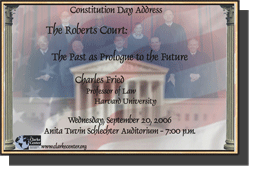Wednesday, September 20, 2006
The Roberts Court: The Past as Prologue to the Future
Anita Tuvin Schlechter Auditorium, 7:00 p.m.

Issue in Context
Constitutional law focuses predominantly on conflicts surrounding peoples’ individual rights. The issues of abortion and gay marriage are particularly fervent disputes today. However, our Constitution affects far more than social issues. The changing politics, strategies, and technology of warfare, especially since the attacks of September 11, 2001 have greatly affected how our Constitution is interpreted, and perhaps more importantly, how the rest of the world follows this interpretation. As soldiers, or rather “enemy combatants,†are captured, situations may and have arisen in which our Constitutional rights apply to them, especially if they are citizens of the U.S. Although some believe that members of the Supreme Court should act mechanically in their interpretation of the law, the idea of a mechanical interpretation is impossible as interpretation is not based on facts. Thus, the members of the Court will always affect the decision reached.
About the Speaker
Professor Fried was born in Prague, Czechoslovakia in 1935 and became a United States citizen in 1948. He served as a law clerk to Justice John Marshall Harlan, as a special assistant to the Attorney General, and held advisory roles for the Department of Transportation and the Executive Office of the President. In 1985 he was appointed solicitor general in which he represented the Reagan Administration before the Supreme Court in twenty-five cases. From 1995 to 1999 he served as an associate justice of the Supreme Judicial Court of Massachusetts. Professor Fried has served on the Harvard Law School faculty since 1961 and has lectured on such topics as human values and medical ethics. He is a member of the National Academy of Sciences’ Institute of Medicine, the American Academy of Arts and Sciences, and the American Law Institute. He received his BA from Princeton University , his B.A. and Master’s in Law from Oxford University, and his J.D. from Columbia University .
Related Links
Cornell Legal Information Institute
FindLaw Constitutional Law Center
Hieros Gamos Legal Directory
University of Chicago Guide to Constitutiional Law
